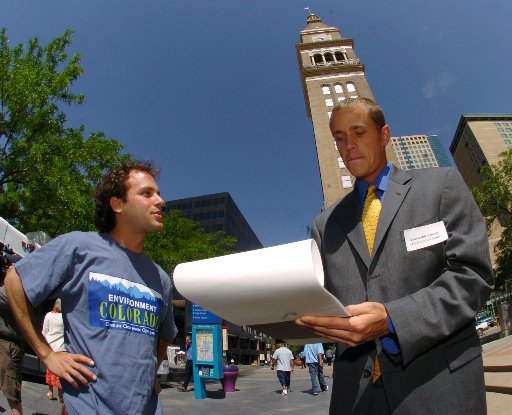The Supreme Court decision in Meyer v. Grant, 486 U.S. 414 (1988), invalidated a provision of a Colorado statute that made it a felony to pay persons to circulate petitions calling for the inclusion of initiatives on state ballots. In doing so, the Court upheld the holding of an en banc session of the Tenth Circuit Court of Appeals, which had overturned an earlier decision by a three-judge panel of the same appeals court that had upheld the law.
Court struck down Colorado statute restricting ballot initiative petitions
Justice John Paul Stevens wrote the opinion for a unanimous Court. Because the Colorado law involved limits on political expression, he found it should receive exacting scrutiny. He further believed the law limited speech by limiting “the number of voices who will convey appellees’ message,” making it less likely that individuals could place items on the ballot. Although Stevens acknowledged that citizens could disseminate their ideas in other ways, he argued that the law “restricts access to the most effective, fundamental, and perhaps economical avenue of political discourse, direct one-on-one communication. That it leaves open ‘more burdensome’ avenues of communication, does not relieve its burden on First Amendment expression.”
Colorado sought to rely on the Court’s decision in Posadas de Puerto Rico Associates v. Tourism Company of Puerto Rico (1986), but Stevens observed that the speech in that case was commercial, whereas Meyer centered on purely political speech. Stevens further rejected the state’s argument that the law was needed to ensure that initiatives had statewide support; the state had already addressed this concern, Stevens noted, by specifying the number of signatures needed.
He further rejected the idea that paid solicitors were more likely to forge names. Stevens observed that professional circulators, “whose qualifications for similar future assignments may well depend on a reputation for competence and integrity,” would be no more likely than others to engage in fraud. Moreover, he pointed out that other Colorado laws made it a crime to forge such signatures. Stevens cited Buckley v. Valeo (1976) for the principle that “[l]egislative restrictions on advocacy of the election or defeat of political candidates are wholly at odds with the guarantees of the First Amendment.” Further citing Buckley, Stevens said that the principle “applies equally to ‘the discussion of political policy generally or advocacy of the passage or defeat of legislation.’ ”
Court struck down other Colorado petition laws later
Over a decade later, in Buckley v. American Constitutional Law Foundation (1999) the Court struck down other Colorado laws that required persons soliciting signatures to be registered voters, wear name tags, and file lengthy monthly disclosures.

